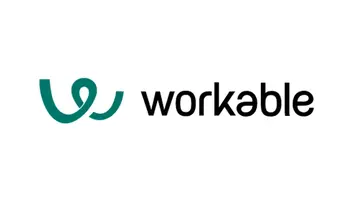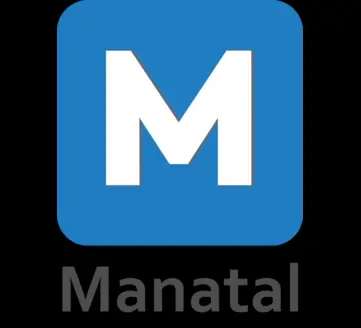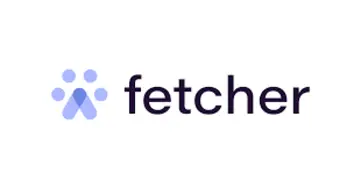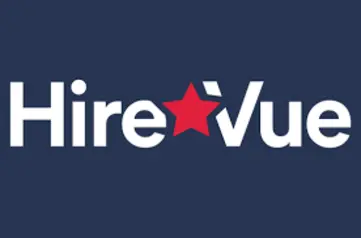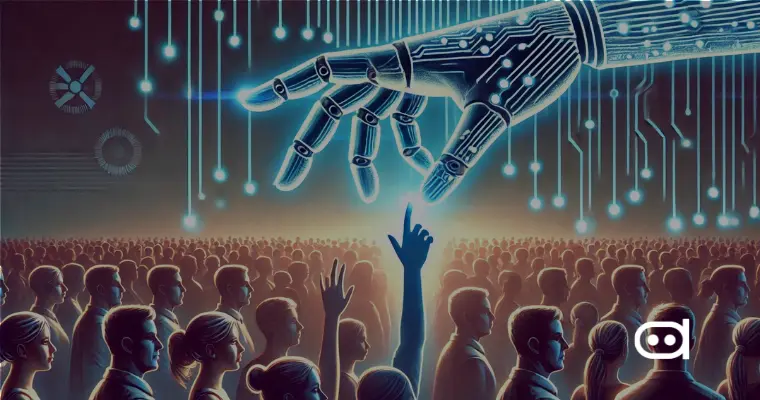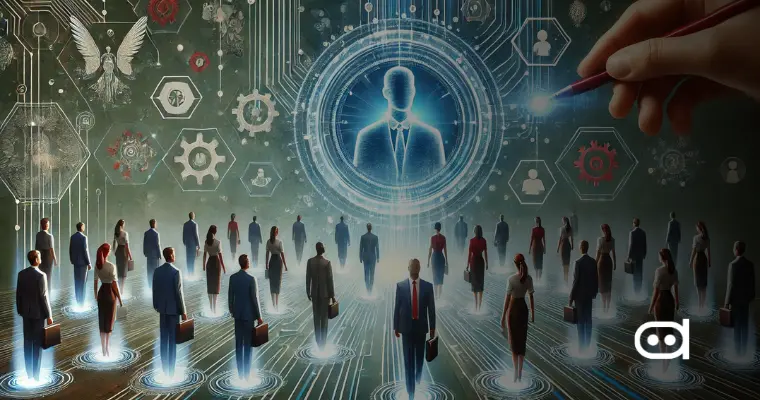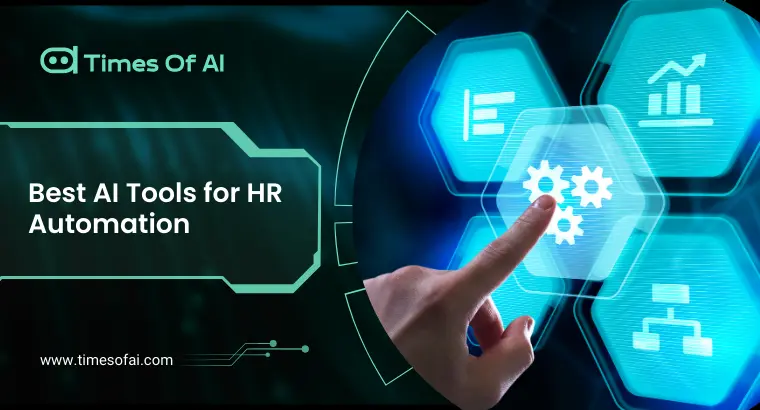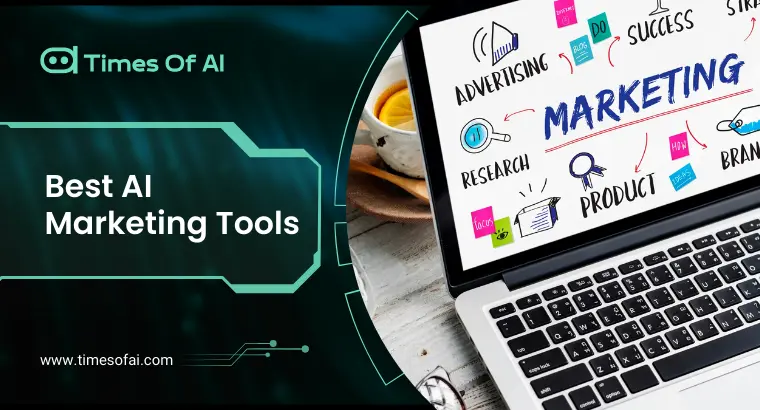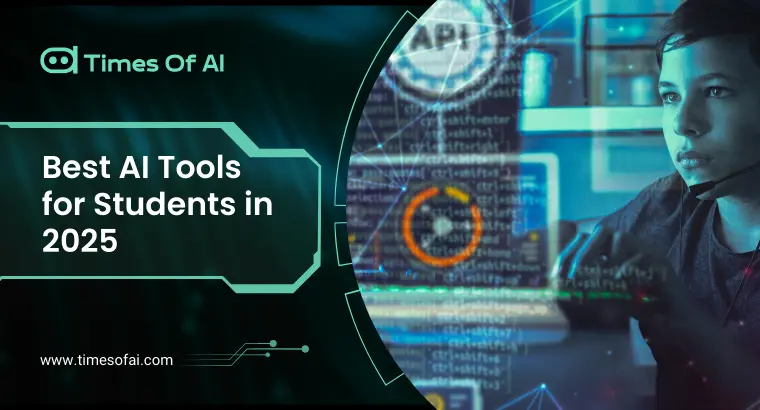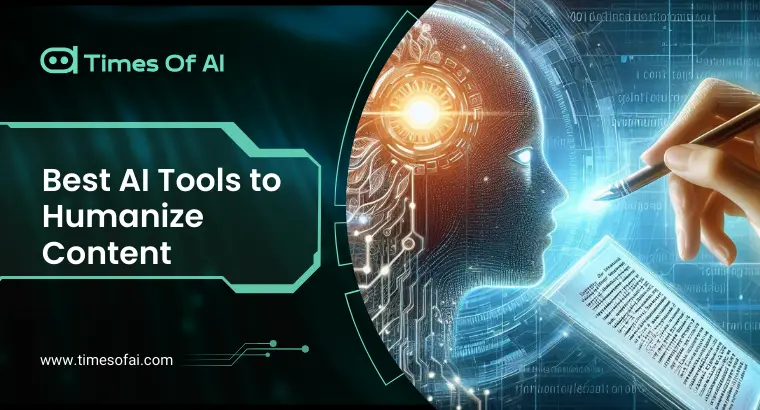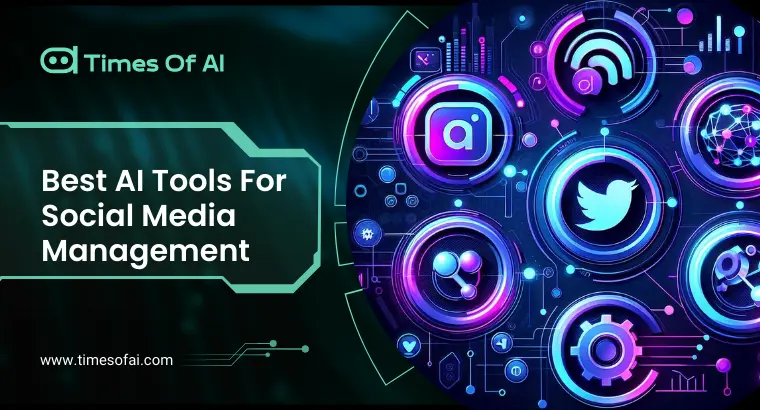
5 Best AI Recruiting Tools That Can Transform Hiring in 2025
Hiring trends have accelerated to the point where AI-powered recruitment has become the most significant tool. Companies are increasingly relying on AI to streamline hiring processes and stay competitive in the talent market. AI is required for seamless and rapid recruitment, particularly in areas such as sourcing candidates, screening resumes, and efficiently communicating with talent pools. By automating these operations, AI reduces time-to-hire and improves decision-making, ensuring recruiters focus on high-value activities such as interviews and relationship-building.
This article outlines the top 5 AI recruiting tools for 2025, featuring their pros, cons, and functionalities. It highlights how these tools enhance efficiency, reduce biases, and support recruiters in identifying the best-fit candidates. Whether you’re a recruiter in a large corporation or a growing startup, understanding and leveraging AI tools will be crucial to optimizing your hiring strategy and staying ahead in the evolving recruitment landscape.
Key Takeaways
- An AI recruiting platform adds effective automation of repetitive tasks and better engagement between candidates and recruiters.
- Some of the best AI tools in recruitment, like Workable, Manatal, Fetcher, Entelo, and HireVue, have great features.
- Such platforms revolutionize the hiring of candidates through sourcing, screening resumes, and improving their overall experience.
- Investing in an exclusive AI recruiting tool helps organizations save time and resources and discover the right applicants for their companies.
Best AI Recruitment Platforms Explained
| Tools | Best For | Prices | Platform Compatibility |
|---|---|---|---|
| Workable | Best for businesses of all sizes seeking a comprehensive hiring solution | Starter: $189/Month Standard: $313/Month Premier: $628/Month | Both mobile apps and website |
| Manatal | Ideal for businesses prioritizing AI-driven recruitment and automation | Professional Plan: $15 Enterprise Plan: $35 Enterprise Plus Plan: $55 | No mobile app Web browser |
| Fetcher | Best suited for companies looking to source a diverse pool of candidates efficiently | Amplify: $549 /user/mo |
Web browser |
| Rival HR-Entelo | Ideal for businesses aiming to accelerate top talent acquisition and improve diversity | Not Disclosed | Web browser |
| Hirevue | Best for companies seeking a video interview and assessment platform with AI-powered features | Basic: Free Pro: $29 Monthly Lifetime: $249 One-Time |
Web browser |
Let's explore the 5 Best AI Recruitment Tools in detail:
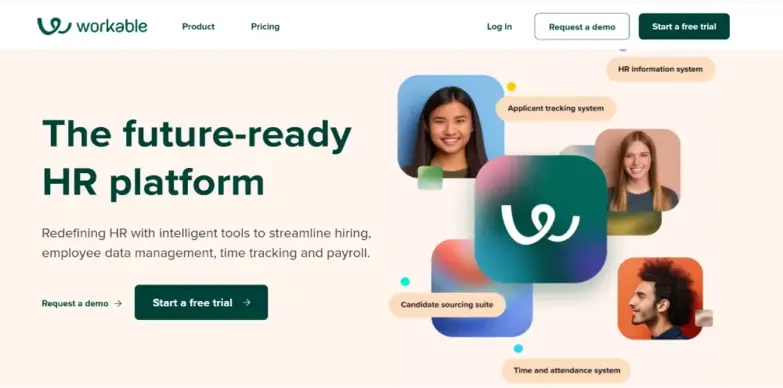
Introduction
Workable is a modern, AI-powered applicant tracking system that makes the recruitment process simple for small to medium enterprises. Its features include job posting to 200+ boards, candidates sourced by AI, 20+ pre-built reports, D&I anonymization, and built-in assessments that include video interviews.
Workable is perfect for companies that want to attract potential talent from different cultural backgrounds. The platform offers LinkedIn Recruiter integration and global hiring support. It also offers tools like Salary Estimator and AI-enhanced applicant matching, which improve the sourcing and requisitioning procedures. Recently, Workable introduced HRIS elements such as time-off tracking, employee file talent management, and organizational charts, expanding its wide range of capabilities. For a deeper understanding of how the platform supports global hiring and talent management, check out our Workable review
Key Feature
- Comprehensive Sourcing Tools: AI tools for recruiting and integration with LinkedIn Recruiter offer top candidates by scanning 400 million qualified profiles and matching them to vacancies.
- Globalization Capacity: Workable facilitates hassle-free international employment by providing local recruitment support, multilingual options, and international job boards.
- Integrated Onboarding and HRIS Features: Get integrated onboarding, absence tracking for employees, and employee record management within an end-to-end solution for hiring and HR.
- SEO-Optimized Job Descriptions: Write job descriptions using SEO-optimized keywords and post them on the job boards with a single click.
- Integration: 40-plus integrations with HRIS and productivity tools available.
- Centralized System: Real-time reporting and centralized requisitions, approvals, and budgets enable stakeholders to easily access crucial hiring data.
Pros & Cons
- Intuitive and easy-to-use interface for quick adoption
- Offers integrated one-way video interviews and assessments
- In-app HR essentials for managers and job seekers
- Affordable plans as well as a free trial
- Scorecards do not offer too much customization
- Custom reporting is limited
Pricing
- Starter – $189 USD/month
- Standard – $313 USD/month
- Premier – $628 USD/month
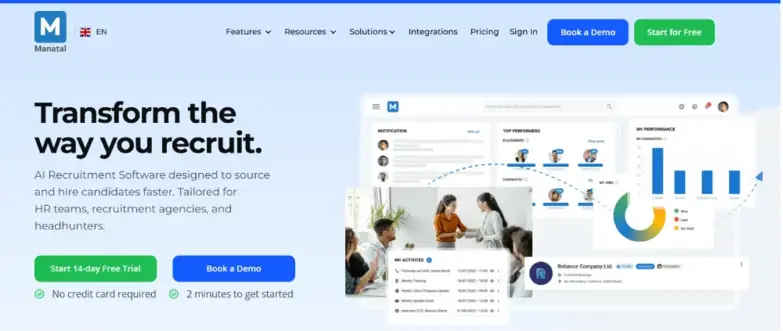
Introduction
Manatal is one of the best AI recruitment tools, as it combines a complete candidate relationship management system with a recruitment application. It functions by categorizing candidate profiles, making it simple to scan through resumes, and maintaining a comprehensive database of candidates for recruitment agencies and human resources departments. Designed for staffing professionals, headhunters, and hiring managers, it features drag-and-drop interfaces, messaging functions, and AI recommendations to help identify the right candidates.
This recruitment platform meets the challenges of managing massive applicant volumes, improves candidate ratings, and offers team collaboration tools. Some of its main benefits include a career page builder, compliance tools for different regulations, a Chrome extension for easy data capture, an integrated schedule with Google Calendar, and social media enrichment tools to broaden candidate insights. According to user reviews, the support team is responsive, and the scorecard and advanced search functions allow for the tracking of metrics and KPIs.
Key Feature
- Applicant Tracking Systems (ATS): Track applicant movement accurately along the hiring pipeline.
- Employee Onboarding: New hires can be more effortlessly incorporated into the company by implementing an onboarding strategy.
- Personnel Tracking: Maintaining a detailed record of employee information is important for HR management.
- Compliance Management: Maintains the legality of recruitment practices, which is particularly critical for worldwide operations.
- Interview Management: Interviewers and candidates will find it much easier to schedule interviews.
- HR Reporting: Reporting tools come equipped with powerful analytics for more robust decision-making.
- Social Media Recruitment: The ability to integrate directly with social media for recruitment makes the search options very unique.
Pros & Cons
- A user-friendly interface offers a shorter learning curve.
- Ensure recruitment practices comply with regulations.
- AI-driven recommendations and social media recruitment features are available.
- Personalization options for workflows and processes may be limited.
- Integration with other HR tools can be challenging.
Pricing
- Professional Plan – $15/per user per month
- Enterprise Plan – $35/per user per month
- Enterprise Plus Plan – $55/per user per month
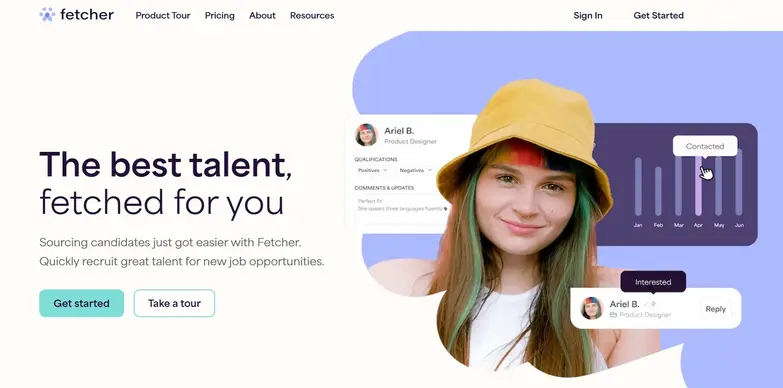
Introduction
Fetcher automates repetitive recruitment tasks like sourcing, outreach, follow-ups, and applicant sorting. This AI-enabled solution recognizes the qualities of candidates sought by a company and processes applicants in that category. Fetcher’s talent sourcing automatically finds candidates based on the job description and initial feedback.
Outreach tools automate email follow-ups and offer customizable email sequences to maintain candidate engagement. Recruitment teams can also personalize all email messaging to the specific candidate and position. The reminders tab aids in reminding the user about candidates’ responses and guarantees prompt dispatch of replies.
Fetcher provides each user with insights into the hiring performance of their team, as well as the ROI for each role, using up-to-date analytics. Critical outreach metrics summarize the success achieved through the whole hiring funnel in one view. It includes a team dashboard and allows users to understand both team and individual performance to identify the best practices and optimize the hiring results.
Key Feature
- Analytics and Dashboard: Monitor recruitment metrics like pipelines, email campaigns, diversity, and team performance for data-based decision-making.
- Diversity sourcing: Create inclusive talent pipelines, tailoring diversity goals, and in-depth analysis using advanced tools.
- Automation and Engagement: Automate customized outreach for better candidate contact and smoother communication throughout the onboarding process.
- Integration with ATS and CRM: Centralize workflows through integration with ATS, CRM, email, and Slack, and streamline bi-directional tasks such as scheduling and emails.
- Profile Directory: Easily filter by skills, locations, or keywords to manage profiles as well as use these directories for targeted email campaigns.
- Personalized Email Campaigns: One of the best recruiting AI tools for fully automating email sequences and responses based on the role, boosting engagement and saving time.
Pros & Cons
- Sourcing tool providing access to the best candidates
- Automated outreach feature sends cold emails and personalized messages
- Combines AI and human-in-the-loop insights
- Some users experienced bugs and glitches
- May source either overqualified or underqualified candidates for a particular role
Pricing
- Amplify: $549/user/mo
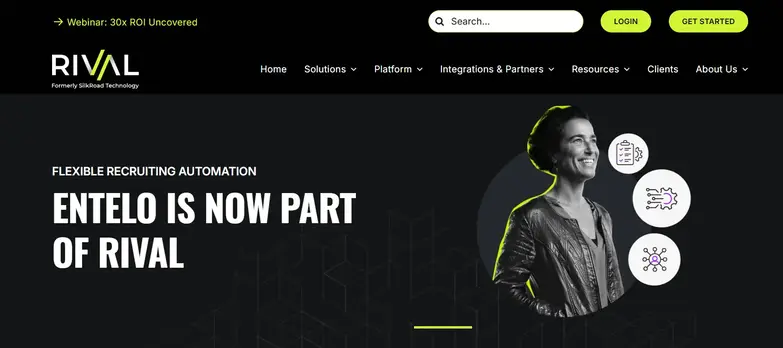
Introduction
Entelo, now part of RIVAL, is a popular recruitment platform and helps businesses get the right talent on board with its powerful AI features. It helps recruiters find their dream candidates as it offers profile details along with contact entries to help recruiters send invitations and arrange direct communication.
It also offers email engagement tracking, which provides details regarding candidate actions such as opens and clicks. This information is used to evaluate the efficacy of messaging, enabling recruiters to gain a more comprehensive understanding of the outreach strategy. Entelo really drives efficiency into workflow with role-specific custom templates and automated follow-ups, thus saving time without compromising on communication quality.
Key Feature
- Candidate Sourcing: To ensure accurate sourcing results, over 500 million candidates can be searched using advanced filters, Boolean queries, and keywords.
- Email Campaigns: Build brand campaigns for requisitions, candidate re-engagements, and event promotions to meet specific hiring needs.
- Talent Pool Automation: Automatic candidate engagement will activate journey-based workflows and internal alerts and notifications for timely updates and smooth communication.
- Candidate Engagement: Potential candidates can be contacted by email, SMS, live chat, and self-scheduling tools, enabling remote recruiting with digital interviews and questionnaires for application evaluation.
- Comprehensive Talent Analytics: Empower hiring through advanced analytics and reporting capabilities.
- Seamless Integration: Combine with the top applicant tracking systems and human resource information systems for a seamless recruitment workflow.
Pros & Cons
- Provides option for event promotion
- Extensive candidate surveys are available
- Option to create customized reporting
- Get live SMS and email statistics
- Customization options for candidate search criteria may be restrictive
- New users might find the interface complex
Pricing
- Entelo Starter – $149/month1
- Entelo Growth – $499/month
- Entelo Enterprise – Custom pricing
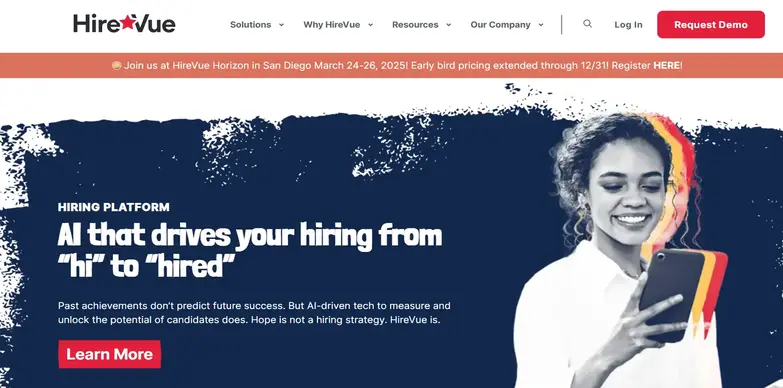
Introduction
An all-in-one automated recruitment solution, HireVue provides video interviewing, interview building, assessment, scheduling, recruiting, and text-based recruiting. Among the key benefits of video interviewing is asynchronous interviewing, which HireVue has in addition to live interviews. Candidates do not need an additional download to conduct an interview from their mobile phones. Create interviews by selecting from over a thousand job-specific interview guides validated by organizational psychologists. Their team of psychologists collaborates with you to develop talent assessments, psychometric tests, and coding tests.
A virtual hiring assistant can also help you quicken the process by using text to talk to candidates about the next step in the hiring process. HireVue offers an intelligent virtual assistant that you can use for scheduling, organizing hiring events, and connecting applicants to find a matching role within your company.
Key Feature
- Interview Builder: Create structured interview questions, templates, and evaluation guides to set a standardized process.
- Scheduling: An automated interview scheduling system allows candidates to self-schedule, reschedule, and add reminders.
- Hiring Events: When hosting hiring events, such as career fairs, the self-booking feature enables candidates to book their slots.
- ATS Integration: ATS integration will make the process smoother for collecting data and reduce administrative tasks.
- Standardized Interviews and Reduced Human Bias: More structured, job-specific interview guides validated by psychologists to increase fairness and eliminate assumptions.
- Game-Based Assessments: Candidates can play psychometric games that help assess relevant skills and offer a more adept onboarding process.
Pros & Cons
- Flexible and convenient interviewing experience
- Offers a great UI/UX
- Innovative and always upgrading
- It is not as affordable as compared to other competitors
- Integration with other software is limited
- Has a slight learning curve
Pricing
- Essential – Starting at $35K
- Enterprise – Starting at $75K
- Premium – Custom Pricing
Quick Guide On AI Recruitment Tool
How do AI Recruitment Tools Enhance the Hiring Process
AI-powered recruiting solutions not only automate tedious tasks and improve ways to attract candidates, but they also help small businesses compete in talent acquisition. Here’s how these tools provide value:
Automation of Repetitive Tasks
AI automated recruiting alters how recruiters execute time-consuming processes such as screening resumes, scheduling interviews, and tracking applications. Instead of manually sifting through thousands of resumes, automation creates an algorithm that quickly identifies the most qualified applicants. This frees up precious hours that human resource professionals could spend attending to relationship-building and honing their recruitment strategies. For instance, Manatal and Fetcher are AI-powered recruitment tools that are known to be effective for small businesses in automating repetitive processes in recruitment.
Improved Candidate Sourcing
AI hiring tools open up vast opportunities that span an organization’s job boards, social media, and internal databases. Sophisticated algorithms identify potential candidates whose profiles fit job descriptions even in unconventional sources. The enhanced sourcing capability guarantees the maximum recruitment of talent, irrespective of borders or platforms. Examples of such tools include Entelo, which is known for its wide-ranging sourcing for a quick and high-quality potential candidate hunt.
Enhanced Candidate Experience
Candidate experience is a very important aspect of employer branding, and so is diversity and inclusion in recruitment through AI. Using AI-powered chatbots and personalized engagement systems facilitates resource tracking and interview scheduling. Such interactions provide a good opportunity to make candidates feel valued throughout the hiring journey. For example, HireVue AI recruiting software personalizes communication with AI, which is beneficial for engaging candidates.
Factors to Consider While Choosing the AI Recruiting Tools
Finding the right AI recruiting platforms also requires careful assessment of their alignment with your business goals, hiring needs, and the pros and cons of using AI for hiring. Such factors include the following:
Scalability: Select tools that are scalable so they grow with the organization, accommodating future increases in high-volume hiring and complexity.
Integration Capabilities: Consider that the best AI recruiting software integrates with existing tools such as ATS, CRM, and payroll.
User-Friendliness: An intuitive interface that allows users to understand how to use the technology without requiring extensive training will encourage faster adoption. Dashboards should be easy to navigate and clearly understood in terms of layout and analytics.
Customization Options: It must have custom workflows, custom templates, and adaptive features to align with your specific recruitment process.
How Does AI Software Help Reduce Unconscious Bias in Hiring?
Standardized Processes for Screening Candidates
The role of AI in identifying and eliminating hiring bias is vast. AI-powered tools check employees against predefined elements, keeping appraisals uniform and unbiased. For instance, platforms like HireVue evaluate the candidates not by their identity but by the credentials.
Fair and Unbiased Decision-Making
AI automated recruiting tools measure candidates based on their experience and skill sets. Thus, merit-based employment selection will be guaranteed. For example, Fetcher focuses on data interpretation to provide a competitive environment for all applicants.
Anonymized Candidate Profiles
AI platforms for hiring can anonymize profiles, including information regarding gender, race, photo identification, and any demographic detail about the person to minimize influencing factors that may bring bias. For example, Entelo’s anonymous evaluation feature ensures that recruiters evaluate candidates based on their qualifications, rather than their life stories, leading to a more equitable selection process.
Features You Should Look for in a Reliable AI Recruitment Tool
Resume Parsing
One of the features of AI sourcing technology for recruitment is resume parsing, which extracts and analyzes key components of resumes as part of an automatic resume parsing system. These include skills, experience, education, certifications, and more. This saves time and effort while providing consistency in extraction and minimizing errors. The information is then entered into a standard format that hiring managers may easily sort through. Fetcher and Manatal are tools that improve recruiting speed and productivity by shortlisting candidates who meet the job requirements.
Automated Interview Scheduling
Interview scheduling can pose a significant challenge when numerous individuals and candidates are involved. Automate interview scheduling with calendar sync and set up appointments with ease. Candidates can be seamlessly informed of changes and timings, making recruitment more effective. Workable excels in this area, giving excellent connectivity with various calendar systems for easy scheduling.
Candidate Relationship Management
One of the main reasons for successful recruitment is building relationships with candidates and maintaining them. AI-built candidate relationship management platforms can do wonders to keep a candidate in the loop and engaged during the hiring process. Automating personalized reminders and follow-ups creates a favorable impression and retains candidates. This sort of CRM is most effective in a cutthroat environment in which a candidate receives several offers at the same time. For instance, top AI recruiting tools like Entelo offer solutions to help candidates stay in the loop with the hiring team.
Free Vs Paid - Best AI Recruiting Tools
Costs
Although free tools are budget-friendly for small businesses or start-ups, they are certainly not able to match the above features because they only cover the most basic ones, like resume screening or sourcing candidates. However, if you need advanced features like analytics and automation along with integrations required to manage recruitment at a larger scale, paid AI tools for recruiters will come with a higher investment.
Features
Most free tools focus on the simple and plain tasks, ensuring that AI makes hiring easy. Meanwhile, many of the paid tools include added features such as predictive analytics, actionable insights through AI, and customizable workflows. Manatal is an example of a free tool, suitable for small teams. With a paid plan, Workable provides integration and reporting features for more complex, high-volume onboarding processes.
Scalability
Your hiring needs will expand as your company grows, and paid tools can better handle that growth in volume of hiring. Such tools are typically scalable for size and scope of work, allowing for the addition of more features as needed. Free products can meet small and immediate needs, but as a company grows rapidly, they often fail to meet requirements.
Long-Term Benefits
While there is a high degree of upfront cost with free tools, the long-term payback for the investment of paid tools is usually proportionally higher. Reducing upfront costs for hiring solves many problems in the long run. Less time is necessary to hire expensive candidates. Solutions actually save costs over a long-term period for companies by increasing the efficiency of hiring high-quality candidates within time limits.
What Are the Challenges and Limitations of AI in Recruiting?
Data Privacy Concerns
With AI recruitment technologies processing sensitive candidate data, data privacy and security are primary concerns for organizations that want to ensure compliance with data protection regulations such as the GDPR or CCPA and avoid legal issues while also maintaining trust.
Dependence on Quality Data
AI recruitment software relies heavily on accurate, unbiased, and high-quality data for efficient results. Subpar or incomplete data can significantly impact results and lead to poor decision-making when hiring applicants. A practical example is when previous hiring is prejudiced, and AI automatically replicates prejudices based on past data.
Understanding AI Limitations
Artificial intelligence for hiring may be very proficient in automating the work and also analyzing the data. However, it does not possess the ability to understand context or make intuitive decisions. For instance, AI may not be capable of evaluating cultural fit or creativity, crucial areas that require human judgment. Over-reliance on the AI system can create missed opportunities.
Free AI Platforms for Recruitment
While free AI tools for recruitment may seem appealing due to their low cost, they often lack advanced features such as analytics, integration capabilities, and scalability, which can significantly restrict their use in a large organization or companies with complex hiring processes. This forces most companies into a position where they must eventually buy such options.
Future of AI-Driven Talent Acquisition Process
The future of recruitment is being redefined by AI sourcing technology and advancements as AI makes hiring easy. Organizations are looking for tools that offer predictive analytics, AI engagements, and simple processes for global candidate acquisition. The trend of remote hiring has begun due to the need for virtual interviews and a talent pool that is equally diverse, providing a competitive advantage.
AI simplifies the recruiting process by making tasks easier, improving decision-making, and ensuring inclusivity. The AI based recruitment tools, as opposed to traditional methods, will evolve over time, find a place for adopting new technologies, and consequently offer more intelligent, faster, and adaptable recruitment processes.
The best AI tools for recruiting influence the ease of recruitment. This translates to reduced complexity in the activities, improved decision-making, and increased diversity in the recruitment process. The best-in-use AI platforms for recruiting will nonetheless continue to evolve—from the adoption of their latest technologies to deliver even more intelligent, faster, and more flexible recruitment processes.
Conclusion
AI recruitment tools completely change the way recruitment operates while integrating automatic, data-driven decisions and more engagement with the applicants. Therefore, recruiters can free up their time and minds for strategy by automating tasks such as resume parsing, interview scheduling, and managing relationships with potential talent. Not only can they eliminate unconscious bias from their decisions, but they also utilize sourcing technology to ensure effective and fair candidate acquisition. Future AI hiring software will incorporate remote work and expand the talent pool globally, providing ample opportunities for smarter and scalable hiring solutions.
FAQs
What are AI recruiting tools?
AI tools for recruitment are just platforms that help with using AI to carry out all recruitment activities, which include sourcing, candidate screening, and contacting when performing these tasks.
What is an AI recruiting assistant?
An AI recruiting assistant is an automated application, program, or chatbot that performs tasks, such as assisting in answering applicant questions, scheduling appointments, and guiding applicants throughout the hiring process.
How much do AI tools for recruitment typically cost?
Costs vary widely. Free tools offer basic features, while paid versions range from $50 to $500+ per month, depending on the features and scale.
Are AI hiring tools suitable for all types of businesses?
Yes, AI recruitment software can be adopted by businesses of any scale, from small to big. It offers well-incorporated and scalable options according to its business needs.
Will AI replace human recruiters?
Artificial intelligence does not replace human recruiters but supplements their activities because it helps automate most repetitive tasks, letting them focus more on strategic and interpersonal hiring aspects.
- Key Takeaways
- Best AI Recruitment Platforms Explained
- Quick Guide On AI Recruitment Tool
- Factors to Consider While Choosing the Best AI Recruiting Tools
- How Does AI Software Help Reduce Unconscious Bias
- Free vs Paid
- What Are the Challenges and Limitations of AI Tools for Recruiting?
- Future of AI-Driven Talent Acquisition
- Conclusion
- FAQs
SHARE

